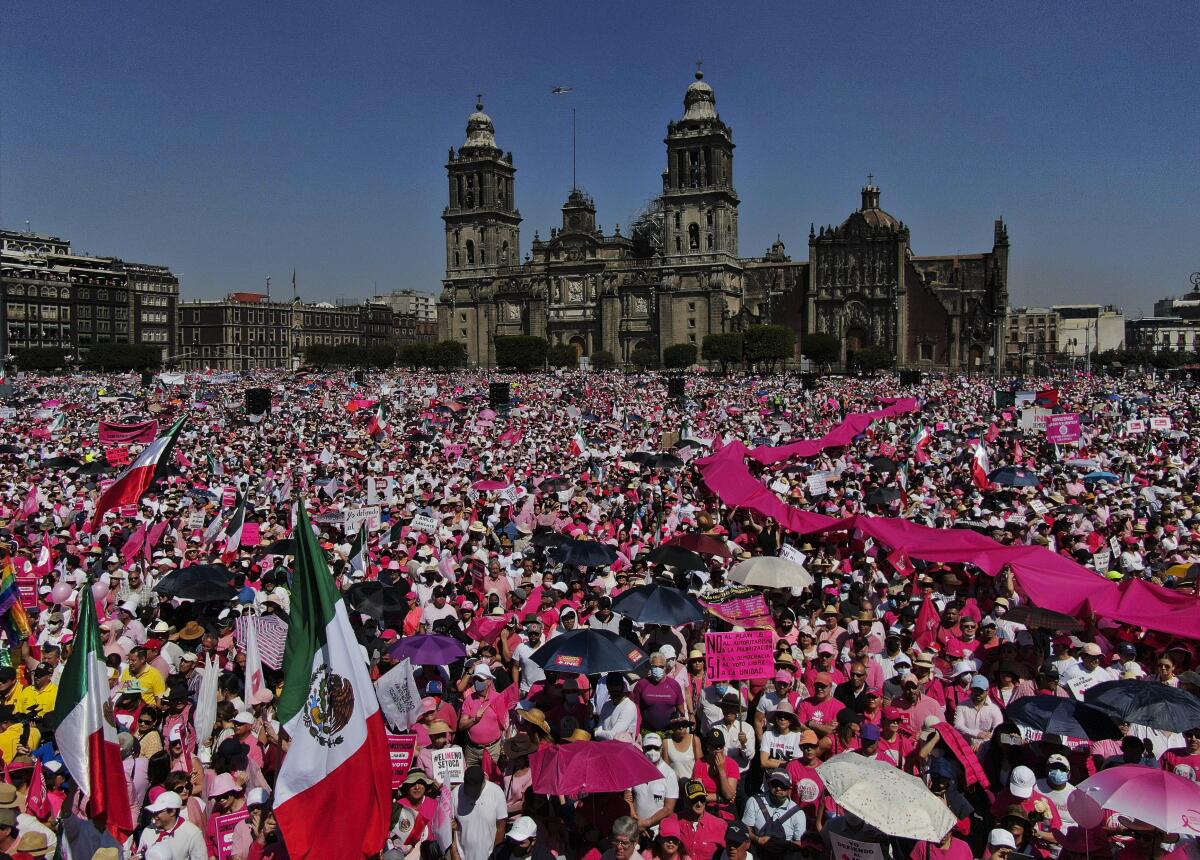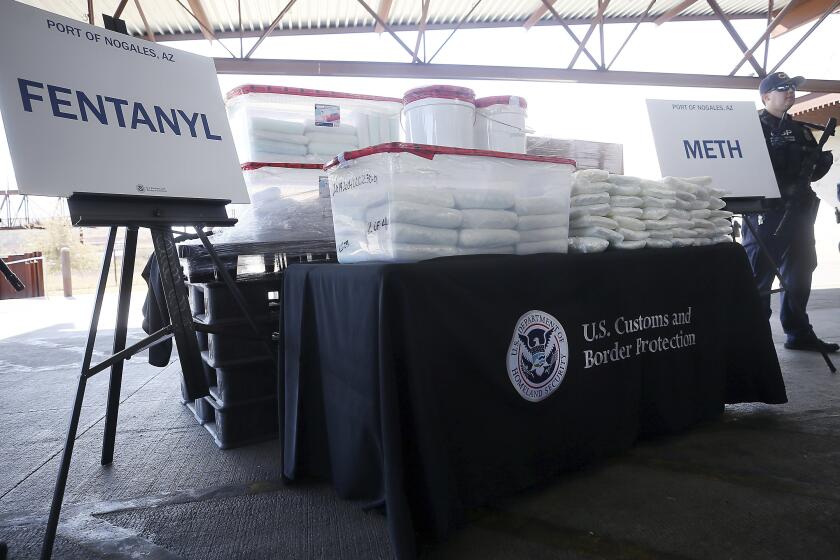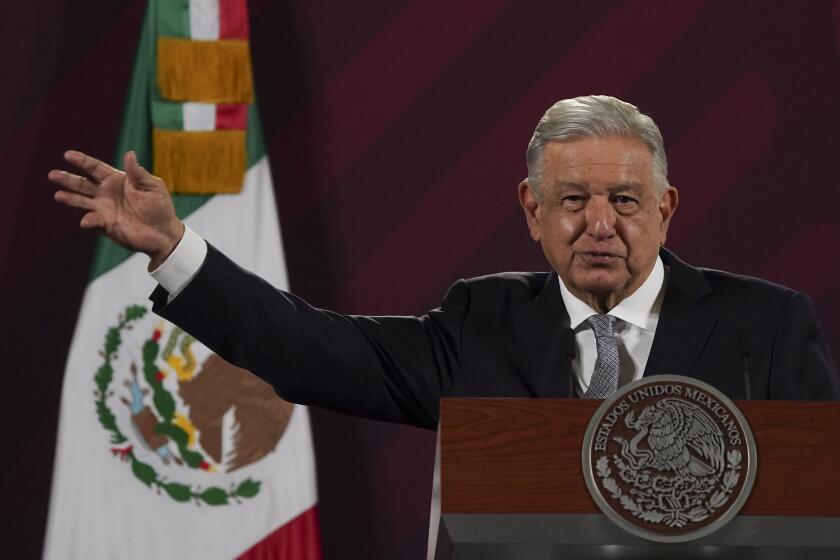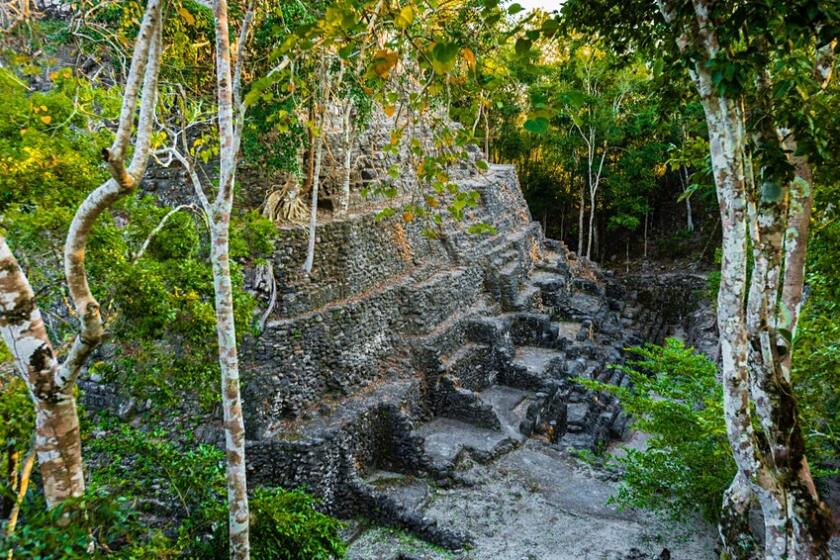Commentary: Is Mexico’s president a threat to democracy?

Mexican President Andrés Manuel López Obrador would like us all to believe that he is the messiah that has come to save his country from the tentacles of corruption.
“It’s not easy to carry out a transformation,” López Obrador said during one of his lengthy daily news conferences earlier this year. This transformation he’s carrying out, he says, will take power away from the elite and hand it to everyday people, finally establishing a true democracy in long-suffering Mexico. The president constantly rails against the “mafia of power” made up by the elites of Mexico — such as corporation owners, judges who rule against him, and political opponents — who use their money and influence to run the country how they see fit, apparently discounting the fact that he himself is now part of that elite.
I don’t need to live in Mexico to recognize when a politician in my native country is giving people atole con el dedo, the well-used Mexican phrase that means trying to put one over on others.
Consider his party’s initiative to convert the National Electoral Institute, known as INE, from a powerful organization that has ensured democratic elections through independent oversight of elections nationwide for more than two decades into a smaller body with fewer resources and less ability to fine political candidates who violate campaign spending rules. The organization, whose independence was guaranteed by constitutional reforms in 1996, oversaw the 2000 election that broke the 71-year rule by the Institutional Revolutionary Party, or PRI. The end to the “Perfect Dictatorship,” as the PRI was called, was the dawn of democracy in Mexico, and met with raucous celebrations in Mexico that I witnessed as a reporter for the Orange County Register covering the historic election.
The latest indictments against Los Chapitos and other alleged smugglers present an opportunity to crack down on trafficking of illegal drugs -- but only if politicians in Mexico and the United States focus on a common goal.
It was also the body that validated the 2006 presidential results, which López Obrador blames for his loss by less than 1%. He also ran unsuccessfully in 2012 but won in a landslide in 2018. Now, AMLO, as the president is known, wants to hobble that agency, to cut what he says is bloated staff and funding and direct the savings to needy people. There’s no question that there’s a lot of need in Mexico, but cutting funding to the institution overseeing elections is not a prudent way forward in a hard-won democracy.
In a meeting with the Los Angeles Times editorial board earlier this year, Mexico’s Foreign Minister Marcelo Ebrard defended his party’s support of changes to the INE, saying that the changes would create a more efficient organization. It was a day after more than 100,000 people marched in protest in the capital after the Mexican Senate voted in favor of cutting the institute’s budget. Ebrard’s statements were predictable, considering that he’s vying for his party’s presidential nomination. By law, AMLO can serve only one term.
With such widespread alarm for what many view as a threat to democracy in Mexico, does the presidential aspirant think that if he were elected people would see his victory as fair? Ebrard hesitated a few seconds before repeating more of the same in response, but after the meeting, he offered to have his staff send me more details about the plan to revamp the INE.
It would be easier to believe the party line if the proposed changes didn’t benefit AMLO’s Morena party, which already holds most of the state governorships and 261 seats in the Mexican Congress.
Andrés Manuel López Obrador is trying to defund one of the world’s most sophisticated election authorities. The Mexican people say no.
Thankfully, the Mexican Supreme Court in early May halted a portion of the initiative to weaken the INE, with one justice saying that “there was no real and substantive democratic deliberation” by legislators in passing the measure. It’s heartening to see at least this pillar of democracy working well.
Five years into his six-year term, AMLO is in a rush to leave his stamp. When he was mayor of Mexico City, he led a revitalization of downtown, restoring historic buildings, creating new shopping zones and housing.
AMLO wants to do the same for the country with the planned Maya Train, a 950-mile railway network through the Yucatán Peninsula. It would link the tourist regions of Cancún and Tulum through ancient Maya sites. AMLO has offered videos produced by his administration featuring leaders of Maya municipalities who say they favor the train because it offers economic benefits for their communities. Environmentalists and other experts say the Maya Train will destroy Indigenous land, ecosystems and the way of life in the area.
AMLO had an approval rating of 84% when he left Mexico City as mayor. Upon winning the presidency in 2018, he promised to get rid of the corruption that befell previous administrations. But his tenure has been disappointing to watch, even from afar.
Archaeologist Richard Hansen has devoted his life to preserving Maya sites and artifacts. But some question whether his efforts will do more harm than good.
I hoped to see AMLO find a way to weaken drug cartels. Instead, the president offered a policy of “hugs, not bullets” to drug traffickers destroying the country. He has allowed the extradition of some cartel leaders to the United States, but has angered U.S. lawmakers with his absurd denials that Mexican cartels produce fentanyl.
I also eagerly awaited to hear whether his administration would tackle the rampant femicides throughout the country. Instead, AMLO has spoken derisively about activists who’ve been working to stem the killings, dismissing them as pawns of conservatives who oppose him.
And would AMLO speak out against the killings of journalists simply for doing their job? No, the president has attacked the media as being sensationalist and once said a journalist’s killing was staged to make his administration look bad. According to the Committee to Protect Journalists, 52 journalists have been killed in Mexico since 2018.
Disturbingly, AMLO is expanding the role of the military. From helping build infrastructure projects like the Maya Train to patrolling streets, the military is now empowered to do more throughout the country. The Mexican economy is strong for now, helping foster AMLO’s continued high approval ratings, but this may change if democracy further erodes.
More to Read
A cure for the common opinion
Get thought-provoking perspectives with our weekly newsletter.
You may occasionally receive promotional content from the Los Angeles Times.














